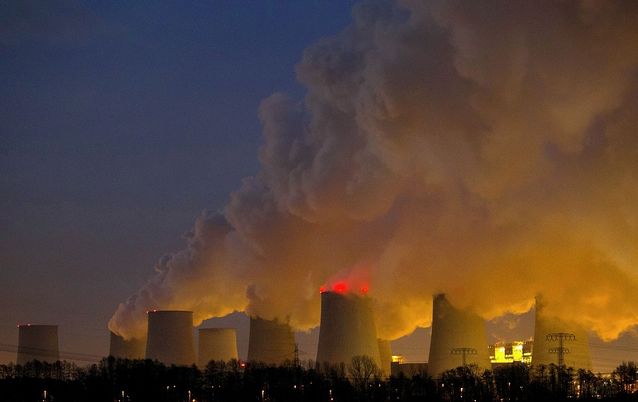Untimely carbon tax will retard industry
by Nonhlalo Mphofu and Bridgette Mokoetle,
2015-12-15 06:22:56.0
ON NOVEMBER 2 the Treasury published a draft Carbon Tax Bill for comment. While it is commendable that the government takes issues of environmental sustainability seriously and is putting in place measures aimed at reducing carbon emissions to sustain the environment, caution must be taken to ensure that such measures — including the introduction of carbon taxes — do not place further strain on the already ailing domestic economy.
The imposition of carbon taxes is considered a more effective instrument for curbing climate change than other measures that have been proposed, such as the introduction of an emissions trading system. In the South African context, carbon taxes augment and align with existing environmental legislation and underpin the "polluter pays" principle.
It therefore stands to reason that the introduction of carbon taxes will play a crucial role in curbing greenhouse gas emissions.
SA should and must play an active role in curbing emissions that are a looming threat to the sustainability of the environment for present and future generations. However, the question is whether SA should be in the front lines of the war against climate change.
There is a need for caution to ensure that efforts to reduce greenhouse gas emissions do not further injure SA’s already bleeding economy or, even worse, get in the way of its economic growth plans.
The draft Carbon Tax Bill has been introduced at a time when the South African economy in general and the metals and engineering sector in particular are burdened with a host of negative economic factors such as higher production costs, lack of demand, labour unrest and bureaucratic red tape.
For a developing country such as SA, which has identified re-industrialisation as a key initiative to unlock economic growth potential, introducing carbon taxes poses the risk of having a negative effect on growth. Industrialisation naturally entails the large-scale introduction of manufacturing and other productive economic activities, which inevitably generate emissions.
Re-industrialising the economy would increase demand for power. SA’s heavy reliance on coal for electricity generation means that as the country re-industrialises and as more power is generated and consumed, more gases will be released into the atmosphere. Imposing carbon taxes would therefore hinder the government’s own objective of stimulating the economy through re-industrialisation. This would deal SA’s growth objectives a serious blow.
Apart from potentially having a negative effect on the government’s own growth plans, such taxes also have the potential to deter foreign direct investment. Why should foreign companies invest in a country that punishes investors with additional taxes when there are other countries on the African continent that have no such taxes?
Another likely unintended consequence of the proposed carbon tax is the effect it would have on consumers, who would ultimately bear the brunt as companies such as Eskom increase tariffs to recoup costs incurred through the imposition of the carbon tax.
SA’s eagerness to decelerate environmental damage displayed in its pledge to reduce emissions 34% by 2020 and 42% by 2025, when the US, one of the biggest polluters, pledged a reduction "in the region of" 17% from its 2005 levels by 2020, is unnecessary.
While we do not in any way condone irresponsible corporate conduct and support sustainability, we believe there is no reason for SA, which contributes less than 1% of global emissions, to take the lead in climate-change mitigation by being one of the few countries to introduce a carbon tax.
• Mphofu is the safety, health, environment and quality executive and Mokoetle the industrial relations and legal services executive at the Steel and Engineering Industries Federation of Southern Africa

Vapor escapes from cooling towers at the lignite coal-fired power plant operated by Vattenfall AB, in Janschwalde, Germany. Picture: BLOOMBERG
ON NOVEMBER 2 the Treasury published a draft Carbon Tax Bill for comment. While it is commendable that the government takes issues of environmental sustainability seriously and is putting in place measures aimed at reducing carbon emissions to sustain the environment, caution must be taken to ensure that such measures — including the introduction of carbon taxes — do not place further strain on the already ailing domestic economy.
The imposition of carbon taxes is considered a more effective instrument for curbing climate change than other measures that have been proposed, such as the introduction of an emissions trading system. In the South African context, carbon taxes augment and align with existing environmental legislation and underpin the "polluter pays" principle.
It therefore stands to reason that the introduction of carbon taxes will play a crucial role in curbing greenhouse gas emissions.
SA should and must play an active role in curbing emissions that are a looming threat to the sustainability of the environment for present and future generations. However, the question is whether SA should be in the front lines of the war against climate change.
There is a need for caution to ensure that efforts to reduce greenhouse gas emissions do not further injure SA’s already bleeding economy or, even worse, get in the way of its economic growth plans.
The draft Carbon Tax Bill has been introduced at a time when the South African economy in general and the metals and engineering sector in particular are burdened with a host of negative economic factors such as higher production costs, lack of demand, labour unrest and bureaucratic red tape.
For a developing country such as SA, which has identified re-industrialisation as a key initiative to unlock economic growth potential, introducing carbon taxes poses the risk of having a negative effect on growth. Industrialisation naturally entails the large-scale introduction of manufacturing and other productive economic activities, which inevitably generate emissions.
Re-industrialising the economy would increase demand for power. SA’s heavy reliance on coal for electricity generation means that as the country re-industrialises and as more power is generated and consumed, more gases will be released into the atmosphere. Imposing carbon taxes would therefore hinder the government’s own objective of stimulating the economy through re-industrialisation. This would deal SA’s growth objectives a serious blow.
Apart from potentially having a negative effect on the government’s own growth plans, such taxes also have the potential to deter foreign direct investment. Why should foreign companies invest in a country that punishes investors with additional taxes when there are other countries on the African continent that have no such taxes?
Another likely unintended consequence of the proposed carbon tax is the effect it would have on consumers, who would ultimately bear the brunt as companies such as Eskom increase tariffs to recoup costs incurred through the imposition of the carbon tax.
SA’s eagerness to decelerate environmental damage displayed in its pledge to reduce emissions 34% by 2020 and 42% by 2025, when the US, one of the biggest polluters, pledged a reduction "in the region of" 17% from its 2005 levels by 2020, is unnecessary.
While we do not in any way condone irresponsible corporate conduct and support sustainability, we believe there is no reason for SA, which contributes less than 1% of global emissions, to take the lead in climate-change mitigation by being one of the few countries to introduce a carbon tax.
• Mphofu is the safety, health, environment and quality executive and Mokoetle the industrial relations and legal services executive at the Steel and Engineering Industries Federation of Southern Africa



























Change: -0.28%
Change: -0.16%
Change: -0.73%
Change: 0.29%
Change: -1.47%
Data supplied by Profile Data
Change: 0.49%
Change: 2.00%
Change: -0.24%
Change: 0.00%
Change: 1.95%
Data supplied by Profile Data
Change: 0.19%
Change: 0.06%
Change: 0.19%
Change: 0.73%
Change: 0.45%
Data supplied by Profile Data
Change: 0.47%
Change: -0.21%
Change: 0.26%
Change: -0.20%
Change: -0.32%
Data supplied by Profile Data